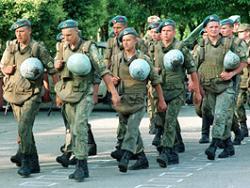
THE WEST RESPONDS WEAKLY TO RUSSIAN CHALLENGES IN GEORGIA: PART I
Publication: Eurasia Daily Monitor Volume: 5 Issue: 87
By:

On May 6 the Bush administration issued the strongest Western statements thus far in response to Russia’s overt seizure of Abkhazia. Blaming the Russian government for its “provocative actions that have increased tensions with Georgia [and] significantly and unnecessarily heightened tensions in the region,” White House spokesperson Dana Perino “strongly urged the Russian government to de-escalate and reverse these measures” and “cease further provocation.” The White House calls on Russia to “reiterate its commitment to Georgia’s territorial integrity and sovereignty” and “begin playing a true mediator’s role” in the dispute (AP, Reuters, May 6).
While strong in its language, the statement comes belatedly (Former Russian President Vladimir Putin’s April 16 decree had announced the overt annexation of Abkhazia), and it suggests purely illusory remedies to the conflict. It seems aimed at returning to the frozen-conflict-type situation that prevailed before April rather than at seeking ways to resolve the conflict. White House public communications had sidestepped the issue several times even in the wake of Russia’s April 29 supplementary troop deployment to Abkhazia (AP, Reuters, April 30, May 1, 2). Even so, the Bush administration’s public tone is more forthright than the prevailing appeasement in Europe in the face of open annexation by force.
Until now, Moscow had regularly professed to respect “Georgia’s territorial integrity and sovereignty” even as it proceeded systematically to incorporate Abkhazia and South Ossetia de facto into Russia. Known as a “creeping annexation” until now, that process gained galloping speed and an overt character with Moscow’s April 16 and April 29 political and military moves.
Russia’s official recognition of Georgia’s integrity and the inviolability of its borders could only be taken at face value in the narrowest sense, insofar as Russia did not officially pose territorial claims to Abkhazia and South Ossetia. Russia was, however, annexing the two territories de facto by stationing troops there, arming local proxy troops, shifting the Russia-Georgia border in both territories, appointing the two secessionist leaderships (largely through the Russian security services), underwriting the ethnic cleansing of Georgians from Abkhazia, taking over property there, and distributing Russian passports in mass to local residents, for whom Moscow proceeded to claim the right of intrusive protection. All along, the West collectively pretended to accept Russia’s pretense that it recognized Georgia’s integrity and its borders.
Putin’s decree of April 16, however, dropped Russia’s side of that pretense. It instructed the Russian government to establish direct official relations with the secessionist authorities, and it announced that Russia would recognize the legality of those authorities’ acts and decisions. The supplementary military deployment in Abkhazia since April 29 has capped the political and “legal” (in terms of Russian law) recognition of the two secessions, which only falls short of diplomatic recognition. Diplomatic recognition seems highly unlikely, however, because Russia seeks incorporation of, not independence for, those two territories.
Asking Russia to rescind, or refrain from implementing, Putin’s April 16 decree, as Western governments have done, is redundant and irrelevant. The decree has changed almost nothing on the ground. It merely turns the de facto situation into an official one. With or without the decree, Russian entities can, and probably will, massively take over real estate in Abkhazia (including the property of expelled Georgians), deploy more military forces to “protect Russian citizens,” demonstrate that Russia-sponsored ethnic cleansing pays off in post-Soviet territory, rebuild and expand the Ochamchire naval base (if Moscow so decides), and use Abkhazia as a staging ground for building up nearby Sochi for the Olympic Games.
A relevant Western response, based on international and humanitarian law, could well include: a declared commitment to reverse the ethnic cleansing and to the safe return of Georgians to their homes; a pronouncement declaring Russia’s “passportization” of Abkhazia’s residents as invalid under international law; explicit non-recognition of Russia’s claim to “protect” such “citizens”; a demand for international inspection of Russian military arsenals in Abkhazia (an internationally recognized Georgian territory), including the Gudauta base and the heavy weaponry stockpiles breaching the Treaty on Conventional Forces in Europe (CFE); and the withholding of ratification of the treaty adopted in 1999, pending rectification of Russia’s breaches of both the 1990 and the 1999 treaties.
Facing the territorial annexation through ethnic cleansing and military force against a Western-oriented country (which is being targeted mainly because of that Western orientation), Western public diplomacy can raise this issue ahead of the Sochi Olympic Games. Those Games are scheduled to be held a few miles from the internationally recognized Russia-Georgia border, a border that Russia has forcibly shifted some90 miles into Georgia.
Moscow will almost certainly use its move in Abkhazia as a potential “precedent” in other former Soviet territories. When Russia’s ambassador in Tbilisi, Vyacheslav Kovalenko, warned, “The Russian constitution stipulates protecting Russian citizens wherever they may be, whether in Abkhazia, Zanzibar, Antarctica, wherever” (Russia Today, May 1), Moscow was probably hinting at its possible options in Ukraine, Moldova, Kazakhstan, or even the Baltic states. An appropriate Western response in Georgia could prevent future crises elsewhere.




